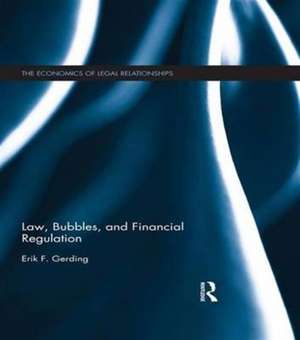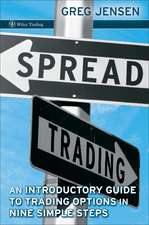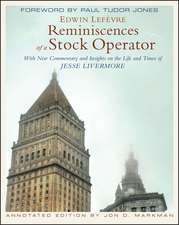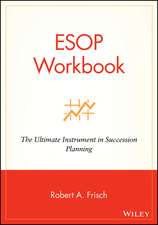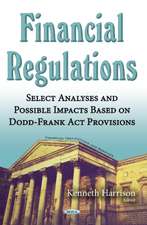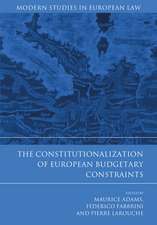Law, Bubbles, and Financial Regulation: The Economics of Legal Relationships
Autor Erik Gerdingen Limba Engleză Paperback – 9 mai 2016
This book examines the interaction of bubbles and financial regulation. It explores the ways in which bubbles lead to the failure of financial regulation by outlining five dynamics, which it collectively labels the "Regulatory Instability Hypothesis." .
The book concludes by outlining approaches to make financial regulation more resilient to these dynamics that undermine law.
| Toate formatele și edițiile | Preț | Express |
|---|---|---|
| Paperback (1) | 489.26 lei 6-8 săpt. | |
| Taylor & Francis – 9 mai 2016 | 489.26 lei 6-8 săpt. | |
| Hardback (1) | 1189.64 lei 6-8 săpt. | |
| Taylor & Francis – 15 noi 2013 | 1189.64 lei 6-8 săpt. |
Din seria The Economics of Legal Relationships
-
 Preț: 449.41 lei
Preț: 449.41 lei - 31%
 Preț: 765.43 lei
Preț: 765.43 lei -
 Preț: 113.91 lei
Preț: 113.91 lei -
 Preț: 500.08 lei
Preț: 500.08 lei -
 Preț: 446.21 lei
Preț: 446.21 lei -
 Preț: 387.75 lei
Preț: 387.75 lei - 25%
 Preț: 562.25 lei
Preț: 562.25 lei - 12%
 Preț: 338.81 lei
Preț: 338.81 lei -
 Preț: 417.20 lei
Preț: 417.20 lei -
 Preț: 283.21 lei
Preț: 283.21 lei - 16%
 Preț: 338.33 lei
Preț: 338.33 lei - 27%
 Preț: 525.19 lei
Preț: 525.19 lei -
 Preț: 485.46 lei
Preț: 485.46 lei -
 Preț: 393.52 lei
Preț: 393.52 lei -
 Preț: 385.47 lei
Preț: 385.47 lei -
 Preț: 396.29 lei
Preț: 396.29 lei -
 Preț: 388.72 lei
Preț: 388.72 lei -
 Preț: 383.50 lei
Preț: 383.50 lei -
 Preț: 382.95 lei
Preț: 382.95 lei - 16%
 Preț: 261.33 lei
Preț: 261.33 lei -
 Preț: 387.87 lei
Preț: 387.87 lei -
 Preț: 420.68 lei
Preț: 420.68 lei -
 Preț: 487.44 lei
Preț: 487.44 lei -
 Preț: 278.13 lei
Preț: 278.13 lei -
 Preț: 383.75 lei
Preț: 383.75 lei - 26%
 Preț: 1243.91 lei
Preț: 1243.91 lei
Preț: 489.26 lei
Nou
Puncte Express: 734
Preț estimativ în valută:
93.63€ • 97.39$ • 77.30£
93.63€ • 97.39$ • 77.30£
Carte tipărită la comandă
Livrare economică 12-26 aprilie
Preluare comenzi: 021 569.72.76
Specificații
ISBN-13: 9781138674394
ISBN-10: 1138674397
Pagini: 560
Ilustrații: 42
Dimensiuni: 156 x 234 x 38 mm
Greutate: 0.45 kg
Ediția:1
Editura: Taylor & Francis
Colecția Routledge
Seria The Economics of Legal Relationships
Locul publicării:Oxford, United Kingdom
ISBN-10: 1138674397
Pagini: 560
Ilustrații: 42
Dimensiuni: 156 x 234 x 38 mm
Greutate: 0.45 kg
Ediția:1
Editura: Taylor & Francis
Colecția Routledge
Seria The Economics of Legal Relationships
Locul publicării:Oxford, United Kingdom
Public țintă
Postgraduate and UndergraduateCuprins
Introduction: The Regulatory Instability Hypothesis Part 1: The Economics and Legal History of Bubbles 1. The Economics of Bubbles 2. A Legal History of Bubbles Part II: The Regulatory Instability Hypothesis 3. Boom, Bust, and the Regulatory Stimulus Cycle in Financial Markets 4. Epidemics of Fraud and Compliance Rot 5. Regulatory Arbitrage Frenzies and the Hydraulics of Investor Demand 6. Deregulation and Regulatory Arbitrage Spirals: a Dance for Two 7. Procyclical Regulation & Herd-Promoting Regulation Part III: Fighting Bubbles, Feeding Bubbles 8. Anti-bubble Laws 9. Credit and Leverage: The Monetary Dimension of Financial Regulation Part IV: The Panic of 2007-2008 as Master Class in Regulatory Instability: The Shadow Banking Bubble 10. The Shadow Banking System: a Thumbnail Sketch 11. '"Lawyers, Runs, and Money": The Rise and Collapse of Shadow Banking Part V: Lessons and Solutions: 12. Conclusion: Adaptive Laws and Channeling Politics: Designing Robust Regulations and Institutions
Notă biografică
Erik F. Gerding is Associate Professor at the University of Colorado Law School
Recenzii
"Erik Gerding is a rare academic who can write penetrating analysis in fluent prose. Law, Bubbles and Financial Regulation is a remarkable book, a page-turner with a legal bent about the economy and financial bubbles. Anyone with an interest in the past financial crisis, or perhaps stopping the next one, should read this book" - Steven M. Davidoff, New York Times “Deal Professor,” Professor of Law, The Ohio State University
"Why do central bankers and regulators seem unable to control the cycles of investor greed and fear that give rise to bubbles and crises and allow the same mistakes to be made over and over again? In Law, Bubbles, and Financial Regulation Erik Gerding draws on his encyclopedic knowledge of history, economics and law to offer an answer. Anyone interested in the ever fascinating story of financial booms and busts should read this provocative and insightful book" - Liaquat Ahamed, winner of the the Pulitzer Prize in 2010 for Lords of Finance
"Professor Gerding explains how bubbles contribute to the erosion of legal rules by regulators and market actors, and how such erosion in turn contributes to increased risk in the financial system. By exploring the multiple channels through which this erosion occurs, Gerding helps us to think about how to better structure the financial regulatory system to be more resilient going forward" - Michael Barr, Professor of Law at the University of Michigan and former Assistant Secretary for Financial Institutions at the U.S. Treasury Department
"Erik Gerding’s insightful new book cuts through a huge maze of arguments about the causes of the 2008-2009 financial crisis that devastated economies around the globe. He provides a subtle, sophisticated, and complex, yet clear and highly readable hypothesis about why financial crises happen from time to time in capitalist economies...A must read for anyone interested in the health and safety of the world’s financial markets!" - Margaret M. Blair, the Milton R. Underwood Chair in Free Enterprise at Vanderbilt University Law School
"The message of Professor Gerding’s complete and compelling retelling of the history of financial crises is straightforward: law matters. He shows that legal rules are central to the buildup of bubbles, instigating – instead of mitigating – mispricing. Regulatory changes explicitly encourage speculative activities and the formation of shadow markets, and also are an implicit accomplice in promoting regulatory arbitrage, centralized private power, and information asymmetry, all of which drive financial mania. Gerding’s coverage of the facts and causes of bubbles is as comprehensive as the writings of Hyman Minsky and Charles Kindleberger, and adds an important legal perspective that is missing from those classic accounts. Indeed, Gerding’s “regulatory instability hypothesis” is a worthy peer to the leading theories of macroeconomic and cyclical causes of bubbles. Law, Bubbles, and Financial Regulation concludes with a valuable and thoughtful array of policy recommendations, and belongs on the bookshelves of modern regulators, who will benefit from thinking not only about the details of the most recent crisis, but about how they are enabling the next one." - Frank Partnoy, George E. Barrett Professor of Law and Finance, University of San Diego School of Law
“Law, Bubbles, and Financial Regulation teaches us how much law matters for the formation of bubbles. The book adds a much needed legal and political dimension to the debate among economists on the causes of and cures for asset price bubbles and financial crises. It examines how the inflation of a bubble undermines financial laws and skews the political system. Economists and policymakers need to read the book to understand how current financial reform efforts may fail during the next bubble and crisis.” - Nouriel Roubini, Professor of Economics and International Business, NYU Stern School of Business and Founder, Roubini Global Economics Monitor
"Why do central bankers and regulators seem unable to control the cycles of investor greed and fear that give rise to bubbles and crises and allow the same mistakes to be made over and over again? In Law, Bubbles, and Financial Regulation Erik Gerding draws on his encyclopedic knowledge of history, economics and law to offer an answer. Anyone interested in the ever fascinating story of financial booms and busts should read this provocative and insightful book" - Liaquat Ahamed, winner of the the Pulitzer Prize in 2010 for Lords of Finance
"Professor Gerding explains how bubbles contribute to the erosion of legal rules by regulators and market actors, and how such erosion in turn contributes to increased risk in the financial system. By exploring the multiple channels through which this erosion occurs, Gerding helps us to think about how to better structure the financial regulatory system to be more resilient going forward" - Michael Barr, Professor of Law at the University of Michigan and former Assistant Secretary for Financial Institutions at the U.S. Treasury Department
"Erik Gerding’s insightful new book cuts through a huge maze of arguments about the causes of the 2008-2009 financial crisis that devastated economies around the globe. He provides a subtle, sophisticated, and complex, yet clear and highly readable hypothesis about why financial crises happen from time to time in capitalist economies...A must read for anyone interested in the health and safety of the world’s financial markets!" - Margaret M. Blair, the Milton R. Underwood Chair in Free Enterprise at Vanderbilt University Law School
"The message of Professor Gerding’s complete and compelling retelling of the history of financial crises is straightforward: law matters. He shows that legal rules are central to the buildup of bubbles, instigating – instead of mitigating – mispricing. Regulatory changes explicitly encourage speculative activities and the formation of shadow markets, and also are an implicit accomplice in promoting regulatory arbitrage, centralized private power, and information asymmetry, all of which drive financial mania. Gerding’s coverage of the facts and causes of bubbles is as comprehensive as the writings of Hyman Minsky and Charles Kindleberger, and adds an important legal perspective that is missing from those classic accounts. Indeed, Gerding’s “regulatory instability hypothesis” is a worthy peer to the leading theories of macroeconomic and cyclical causes of bubbles. Law, Bubbles, and Financial Regulation concludes with a valuable and thoughtful array of policy recommendations, and belongs on the bookshelves of modern regulators, who will benefit from thinking not only about the details of the most recent crisis, but about how they are enabling the next one." - Frank Partnoy, George E. Barrett Professor of Law and Finance, University of San Diego School of Law
“Law, Bubbles, and Financial Regulation teaches us how much law matters for the formation of bubbles. The book adds a much needed legal and political dimension to the debate among economists on the causes of and cures for asset price bubbles and financial crises. It examines how the inflation of a bubble undermines financial laws and skews the political system. Economists and policymakers need to read the book to understand how current financial reform efforts may fail during the next bubble and crisis.” - Nouriel Roubini, Professor of Economics and International Business, NYU Stern School of Business and Founder, Roubini Global Economics Monitor
Descriere
This book examines the interaction of bubbles and financial regulation. It explores the ways in which bubbles lead to the failure of financial regulation by outlining five dynamics, which it collectively labels the "Regulatory Instability Hypothesis."
